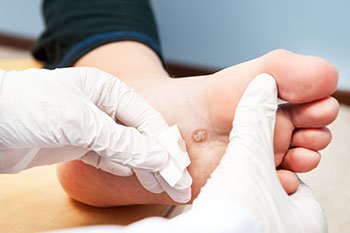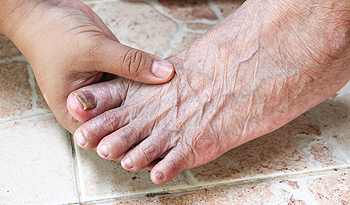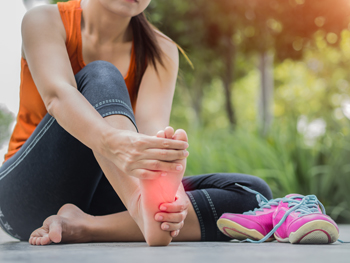Items filtered by date: May 2021
When Should I See a Doctor for Foot Warts?
 Warts that grow on the soles of feet are known as plantar warts. These fleshy, grainy patches of raised skin are known for their characteristic tiny, black dots that appear at their centers. Plantar warts are caused by the contagious human papillomavirus (HPV) entering the feet through a crack in the skin. Unlike other types of warts, plantar warts grow inwards, which can make walking uncomfortable. Warts on the feet generally respond well to treatment. If you have plantar warts that are causing you pain or discomfort, are discolored, show signs of infection such as bleeding, scabbing, and pus drainage, or if you have diabetes or an immune deficiency, you should see a podiatrist who can treat the warts and teach you how to prevent recurrences.
Warts that grow on the soles of feet are known as plantar warts. These fleshy, grainy patches of raised skin are known for their characteristic tiny, black dots that appear at their centers. Plantar warts are caused by the contagious human papillomavirus (HPV) entering the feet through a crack in the skin. Unlike other types of warts, plantar warts grow inwards, which can make walking uncomfortable. Warts on the feet generally respond well to treatment. If you have plantar warts that are causing you pain or discomfort, are discolored, show signs of infection such as bleeding, scabbing, and pus drainage, or if you have diabetes or an immune deficiency, you should see a podiatrist who can treat the warts and teach you how to prevent recurrences.
Plantar warts can be very uncomfortable. If you need your feet checked, contact Gary Cockrell, DPM from Tennessee. Our doctor will assist you with all of your foot and ankle needs.
About Plantar Warts
Plantar warts are the result of HPV, or human papillomavirus, getting into open wounds on the feet. They are mostly found on the heels or balls of the feet.
While plantar warts are generally harmless, those experiencing excessive pain or those suffering from diabetes or a compromised immune system require immediate medical care. Plantar warts are easily diagnosed, usually through scraping off a bit of rough skin or by getting a biopsy.
Symptoms
- Lesions on the bottom of your feet, usually rough and grainy
- Hard or thick callused spots
- Wart seeds, which are small clotted blood vessels that look like little black spots
- Pain, discomfort, or tenderness of your feet when walking or standing
Treatment
- Freezing
- Electric tool removal
- Laser Treatment
- Topical Creams (prescription only)
- Over-the-counter medications
To help prevent developing plantar warts, avoid walking barefoot over abrasive surfaces that can cause cuts or wounds for HPV to get into. Avoiding direct contact with other warts, as well as not picking or rubbing existing warts, can help prevent the further spread of plantar warts. However, if you think you have developed plantar warts, speak to your podiatrist. He or she can diagnose the warts on your feet and recommend the appropriate treatment options.
If you have any questions please feel free to contact our offices located in Brentwood and Madison, TN . We offer the newest diagnostic and treatment technologies for all your foot and ankle needs.
Are You Suffering From Ingrown Toenails?
Avoid Open-Back Shoes
 The feet change as the aging process occurs, which can make elderly individuals more prone to developing foot complications. In the warmer months, many people wear shoes that have an open back, including elderly patients. This can lead to painful foot conditions consisting of cracked heels, plantar fasciitis, and toe injuries. It is beneficial to instead wear shoes that fit correctly, in addition to washing, drying, and moisturizing the feet as part of your daily routine. Shoes that are made from breathable materials may help to avoid foot fungi, including athlete’s foot. Patients who are diabetic must pay extra attention to their feet, and it is important to promptly treat cuts or bruises that appear. If you would like more information about how to care for elderly feet, it is suggested that you confer with a podiatrist.
The feet change as the aging process occurs, which can make elderly individuals more prone to developing foot complications. In the warmer months, many people wear shoes that have an open back, including elderly patients. This can lead to painful foot conditions consisting of cracked heels, plantar fasciitis, and toe injuries. It is beneficial to instead wear shoes that fit correctly, in addition to washing, drying, and moisturizing the feet as part of your daily routine. Shoes that are made from breathable materials may help to avoid foot fungi, including athlete’s foot. Patients who are diabetic must pay extra attention to their feet, and it is important to promptly treat cuts or bruises that appear. If you would like more information about how to care for elderly feet, it is suggested that you confer with a podiatrist.
Proper foot care is something many older adults forget to consider. If you have any concerns about your feet and ankles, contact Gary Cockrell, DPM from Tennessee. Our doctor can provide the care you need to keep you pain-free and on your feet.
The Elderly and Their Feet
As we age we start to notice many changes in our body, but the elder population may not notice them right away. Medical conditions may prevent the elderly to take notice of their foot health right away. Poor vision is a lead contributor to not taking action for the elderly.
Common Conditions
- Neuropathy – can reduce feeling in the feet and can hide many life-threatening medical conditions.
- Reduced flexibility – prevents the ability of proper toenail trimming, and foot cleaning. If left untreated, it may lead to further medical issues.
- Foot sores – amongst the older population can be serious before they are discovered. Some of the problematic conditions they may face are:
- Gouging toenails affecting nearby toe
- Shoes that don’t fit properly
- Pressure sores
- Loss of circulation in legs & feet
- Edema & swelling of feet and ankles
Susceptible Infections
Diabetes and poor circulation can cause general loss of sensitivity over the years, turning a simple cut into a serious issue.
If you have any questions please feel free to contact our offices located in Brentwood and Madison, TN . We offer the newest diagnostic and treatment technologies for all your foot and ankle needs.
Common Running Injuries to the Feet
 Running is a sport that can be great exercise and improve your overall physical fitness, but unfortunately, runners can be prone to foot and ankle injuries. Between 9% and 32% of running injuries affect the lower legs, 4-16% of running injuries affect the ankles, and 5-39% of running injuries affect the feet. Some of the most common lower limb injuries among people who run are Achilles tendonitis, shin splints, plantar fasciitis, stress fractures, and ankle sprains. Furthermore, runners may be prone to ingrown toenails, anterior compartment syndrome, and calf strain. If you are a runner, consult with a podiatrist who can advise you on how to prevent running injuries.
Running is a sport that can be great exercise and improve your overall physical fitness, but unfortunately, runners can be prone to foot and ankle injuries. Between 9% and 32% of running injuries affect the lower legs, 4-16% of running injuries affect the ankles, and 5-39% of running injuries affect the feet. Some of the most common lower limb injuries among people who run are Achilles tendonitis, shin splints, plantar fasciitis, stress fractures, and ankle sprains. Furthermore, runners may be prone to ingrown toenails, anterior compartment syndrome, and calf strain. If you are a runner, consult with a podiatrist who can advise you on how to prevent running injuries.
Exercising your feet regularly with the proper foot wear is a great way to prevent injuries. If you have any concerns about your feet, contact Gary Cockrell, DPM of Tennessee. Our doctor will treat your foot and ankle needs.
How to Prevent Running Injuries
Many common running injuries are caused by overuse and overtraining. When the back of the kneecap starts wearing out and starts causing pain in your knee, this is commonly referred to as runner’s knee. Runner’s knee is a decrease in strength in your quadriceps and can occur if you’re not wearing properly fitted or supporting shoes. To prevent runner’s knee, focusing on hip strengthening is a good idea, as well as strengthening your quads to keep the kneecaps aligned.
What Are Some Causes of Running Injuries?
- One cause of a common running injury is called iliotibial band syndrome.
- Plantar fasciitis is also another common injury.
- Stress fractures can occur from overtraining, lack of calcium, or even your running style.
Best Ways to Prevent Running Injuries
- Wear footwear that fits properly and suits your running needs.
- Running shoes are the only protective gear that runners have to safeguard them from injury.
- Make a training schedule. Adding strengthening exercises as well as regular stretching can help keep you strong and limber and can lessen the possibility of injuries.
- Stretching keeps muscles limber; this will help you gain better flexibility.
If you have any questions please feel free to contact our offices located in Brentwood and Madison, TN . We offer the newest diagnostic and treatment technologies for all your foot and ankle needs.

